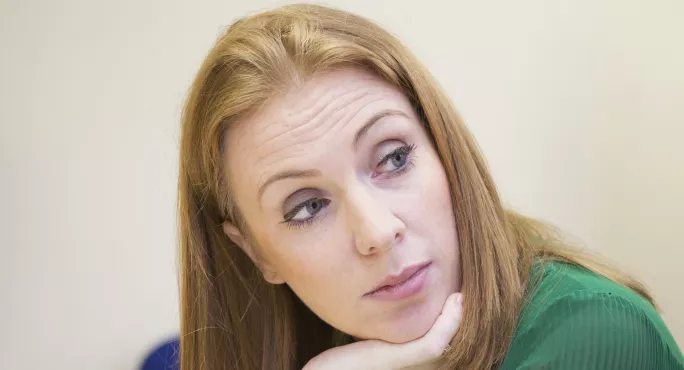- Home
- Angela Rayner outlines 10-point charter for National Education Service
Angela Rayner outlines 10-point charter for National Education Service

Labour has signalled plans for democratic oversight of schools and emotional support for staff as part of a 10-point charter for a National Education Service.
Shadow education secretary Angela Rayner today outlined more details of the proposed cradle-to-grave education service, which has been a flagship policy of Labour leader Jeremy Corbyn.
The proposed charter says schools “should be rooted in their communities, with parents and communities empowered, via appropriate democratic means, to influence change where it is needed and ensure that the education system meets their needs”.
It added that “the appropriate democratic authority will set, monitor and allocate resources, ensuring that they meet the rights, roles, and responsibilities of individuals and institutions”.
National Education Service ‘lifelong’
On education staff, it says the service’s “policies and practices, particularly regarding workload, assessment, and inspection, will support the emotional, social and physical well-being of students and staff”.
Ms Rayner this afternoon told the party’s conference in Brighton: “Our national education service will be lifelong, providing for people at every stage of their life.
“That is our national education service. Not just another structure. Not another new sign on the school gate.”
She criticised the government’s national funding formula for schools, and told delegates “they still won’t meet their promise that funding will go up in real terms over five years”.
She added: “A Labour government would meet that promise instead: a fairer funding formula, but genuinely fair and properly funded.”
Ms Rayner repeated Labour’s pledges to remove the public sector pay cap, invest £8 billion in new school buildings “where they are needed” and commit £13 billion to repair the school estate.
She also said that, if she became education secretary, she would allocate £10 million “to end the scandal of period poverty in our schools”.
The party says it will consult on the principles of the charter across the education sector. The 10 principles are:
- Education has intrinsic value in giving all people access to the common body of knowledge we share, and practical value in allowing all to participate fully in our society. These principles shall guide the National Education Service.
- The National Education Service shall provide education that is free at the point of use, available universally and throughout life.
- The National Education Service provides education for the public good and all providers within the National Education Service shall be bound by the principles of this charter.
- High-quality education is essential to a strong and inclusive society and economy, so the National Education Service shall work alongside the health, sustainability, and industrial policies set by a democratically elected government.
- Every child, and adult, matters, so the National Education Service will be committed to tackling all barriers to learning and providing high-quality education for all.
- All areas of skill and learning deserve respect. The National Education Service will provide all forms of education, integrating academic, technical and other forms of learning within and outside of educational institutions, and treating all with equal respect.
- Educational excellence is best-achieved through collaboration. The National Education Service will be structured to encourage and enhance cooperation across boundaries and sectors.
- The National Education Service shall be accountable to the public, communities, and parents and children that it serves. Schools, colleges, and other public institutions within the National Education Service should be rooted in their communities, with parents and communities empowered, via appropriate democratic means, to influence change where it is needed and ensure that the education system meets their needs. The appropriate democratic authority will set, monitor and allocate resources, ensuring that they meet the rights, roles, and responsibilities of individuals and institutions.
- The National Education Service aspires to the highest standards of excellence and professionalism. Educators and all other staff will be valued as highly-skilled professionals, and appropriate accountability will be balanced against giving genuine freedom of judgement and innovation. The National Education Service shall draw on evidence and international best practice, and provide appropriate professional development and training.
- The National Education Service must have the utmost regard for the wellbeing of learners and educators. Its policies and practices - particularly regarding workload, assessment and inspection - will support the emotional, social and physical wellbeing of students and staff
The proposals were welcomed by Kevin Courtney, joint general secretary of the National Education Union (NEU).
He said: “This charter is a ray of light, illuminating the possibilities for a new education system, after years in which schools and colleges have experienced a narrow curriculum, a punitive system of accountability and a lowering of educational horizons.
“It recognises professionalism. It avoids the language of blame. It commits to the wellbeing of education workers and learners. It pledges to integrate education with social and economic policy, so that schools and colleges are no longer expected to carry most of the burden of transforming lives. It envisages a system restored to democratic control. These principles could fundamentally change for the better our educational system.”
He added that, in the consultation on Labour’s plans, the union would emphasise “the importance of well-trained and qualified professionals, with time and space for continuing their professional development throughout their careers as a key principle, on which NEU would build its vision for education”.
Want to keep up with the latest education news and opinion? Follow Tes on Twitter and like Tes on Facebook
Keep reading for just £1 per month
You've reached your limit of free articles this month. Subscribe for £1 per month for three months and get:
- Unlimited access to all Tes magazine content
- Exclusive subscriber-only stories
- Award-winning email newsletters



